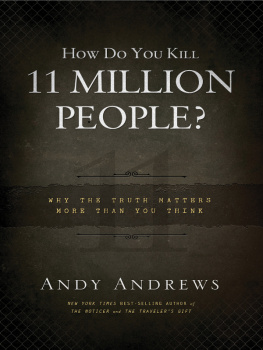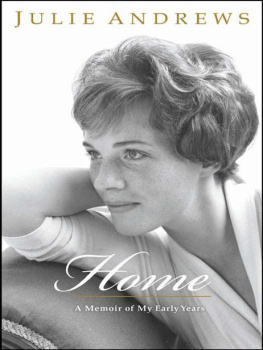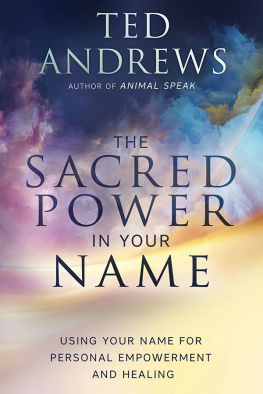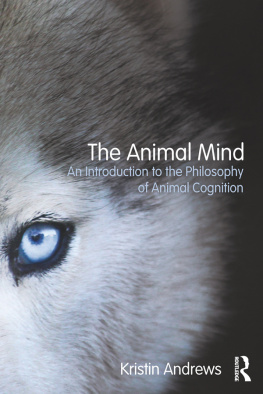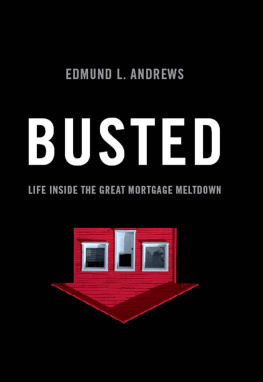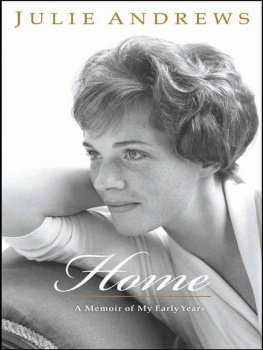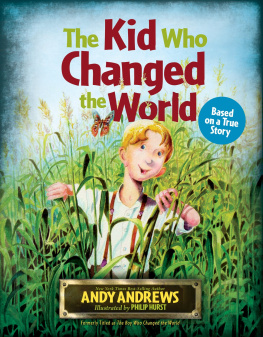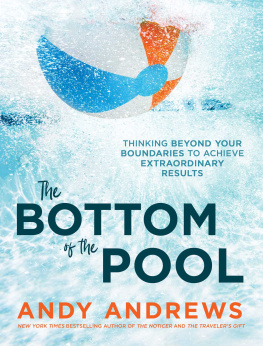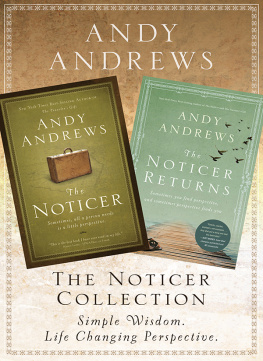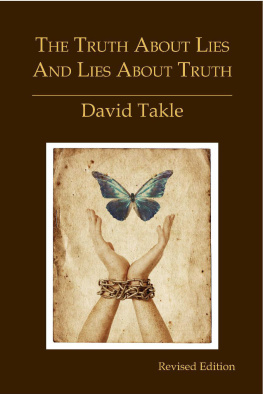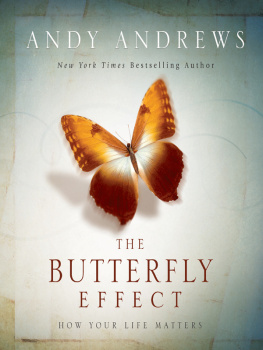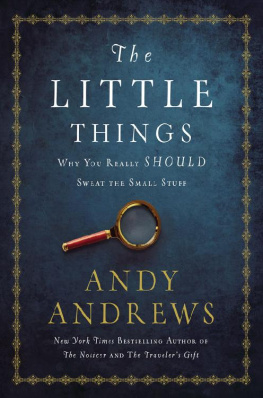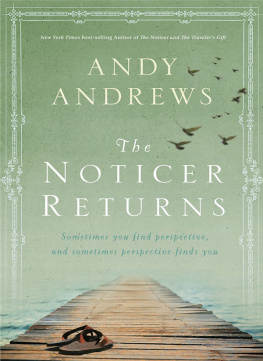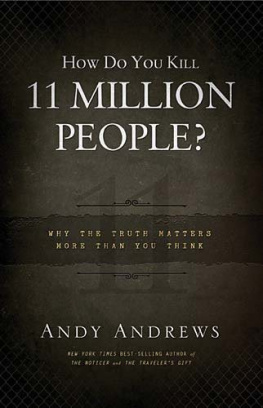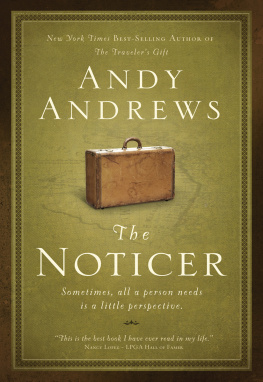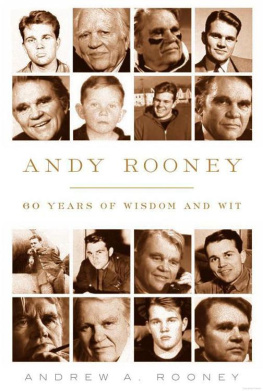
HOW DO YOU KILL
11 MILLION
PEOPLE?

WHY THE TRUTH MATTERS
MORE THAN YOU THINK

ANDY ANDREWS

Contact Andy
To book Andy for corporate events, call
(800) 726-ANDY (2639).
For more information, go to
www.AndyAndrews.com.
2011 by Andy Andrews
All rights reserved. No portion of this book may be reproduced, stored in a retrieval system, or transmitted in any form or by any meanselectronic, mechanical, photocopy, recording, scanning, or otherexcept for brief quotations in critical reviews or articles, without the prior written permission of the publisher.
Published in Nashville, Tennessee, by Thomas Nelson. Thomas Nelson is a registered trademark of Thomas Nelson, Inc.
Thomas Nelson, Inc., titles may be purchased in bulk for educational, business, fund-raising, or sales promotional use. For information, please e-mail SpecialMarkets@ThomasNelson.com.
ISBN: 978-1-4041-8356-8 (IE)
Library of Congress Cataloging-in-Publication Data
Andrews, Andy.
How do you kill 11 million people? : Why the truth matters more than you think / Andy Andrews.
p. cm.
Summary: If the truth is what sets us free, what does it mean to live in a society where truth is absent? How do truth and lies in the past shape our destiny today? Through the lens of the Holocaust, Andy Andrews examines the critical need for truth in our relationships, our communities, and out government Provided by publisher.
Includes bibliographical references.
ISBN 978-0-8499-4835-0
1. DemocracyPhilosophy. 2. TruthPolitical aspects. 3. TruthSocial aspects. 4. Political leadershipUnited States. I. Title. II . Title: How do you kill eleven million people?
JC423.A553 2012
320.01dc23
2011033402
Printed in the United States of America
11 12 13 14 15 QG 9 8 7 6 5 4 3 2 1
Contents
F or many years I have been asked to speak to political gatherings of one type or another. And for many years I have consistently declined. Because the books I write are generally regarded as commonsense literaturenovels that illustrate lifes principlesI suppose many politicians have simply assumed that I was on their side. However, I am not an us or them kind of person. Actually, I am more of a we person.
Dont get me wrongI do have some absolutes carved into my heart and mind, but I am optimistic enough to believe there is still common ground even with those of us who might disagree. Dont we all want the best for our country and a secure and prosperous future for our children? Of course we do. And I believe that we can talk about divisive subjects without screaming at each other.
Somehow, for the most part, our parents and grandparents managed to disagree with their neighbors and still remain neighborly. And they usually did it from their front porches. Today, most of us dont even have front porches. We have retreated to the backyard, where a single opinion can be isolated and enforced by a privacy fence.
Several years ago I asked myself these three questions: Where do we begin to find common ground in regard to what we want (or dont want) for the future of America? Is it possible to write something that doesnt use the words Republican or Democrat, liberal or conservative, yet conveys a message with which everyone could agree? Can it be written in a concise fashion allowing anyone to read it, clearly understand the message, and be empowered in less than fifteen minutes?
Here, then, is my answer to those questions.
ANDY ANDREWS
ORANGE BEACH, ALABAMA
The punishment which the wise suffer who
refuse to take part in the government, is to
live under the government of worse men.
PLATO
F or you shall know the truth, and the truth shall set you free.
Those are probably the most famous words ever spoken on the subject of truth. Most of us accept that particular sentence at face value. It certainly resonates with our spirit. It just feels right. But what does it mean, really? And have you ever contemplated the meaning that comes to light by inverting this principle?
If it is correct that you shall know the truth, and the truth shall set you free, then is it possible that if you dont know the truth, its absence can place you in bondage?
AS A BOY, I quickly learned that if someone found out the truth, I might get in trouble or I wouldnt get chosen or I wouldnt be as well liked. Yet my parents urged me to tell the truth and went so far as to promise I would not be spankedif I only told the truth.
At Heard Elementary School, I told my fourth-grade classmates that Elvis Presley was my cousin. I suppose it was my way of courting popularity at the time. But Elvis was not my cousin. What I had publicly declared in the cafeteria was not true, and for a time, though it didnt seem possible, I became even less popular.
It was a good lesson and helped me determine that, in the future, I would tell the truth.
Once, when I was fifteen, a man in our neighborhood told me that he would pay me fifty dollars for a particular task of yard work. When I finished, he gave me twenty dollars and said that was the amount upon which we had agreed. It was the first time someone had ever looked me directly in the eye and purposefully told me something that was not true. I took note several years later when he was publicly shamed and financially penalized for another instanceentirely unrelated to meof not telling the truth.
Through my formative years and on into young adulthood, the truth became a touchstone, a goalpost, something to strive for. The truth was always within my sight, usually respected but sometimes compromised.
Once, I watched on television as the president of the United States resigned his office in disgrace. At that time, it didnt occur to me that the nation was in so much turmoiland the president was in so much troublenot because of what had been done, but because he had lied about it.
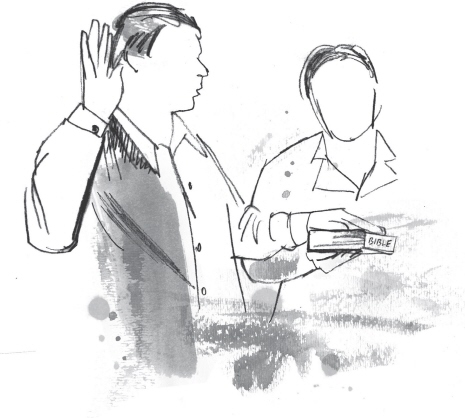
AS AN ADULT, I have become a student of history. For some reason, I am fascinated by what people said and what nations did so many years ago. I am also interested in resultsthe outcomes these civilizations produced as they reacted to what people said and what nations did so many years ago.
I often wonder, do those outcomes have any bearing on us today? Should we be more careful students of the events and decisions that have shaped the lives and nations of those who have gone before us?
A long time ago I decided that if history were to be of any value in my life, I could not succumb to the temptation of convenience in regard to my personal beliefs or desires. In other words, I would not be able to categorize people and nations as good guys or bad guys to suit my political or religious beliefs. The truth in what I uncovered would have to trump everything I had ever been taught or believed. Quietly, I could only hope that what I had been taught and believed was true.
Next page
